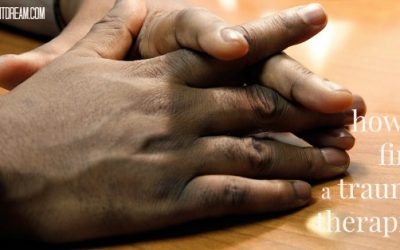PTSD, Stress and Moving On as Special Needs Parents, Pt 8

The Different Dream series about PTSD, stress, and special needs parenting is ready to address a conundrum common to many parents. Simultaneously dealing with stress and moving on as special needs parents and as children growing up with special needs.
Before taking a look at child psychologist Dr. Matheis’ answer to the question, here’s a run down of what the series has covered so far:
- Post One: Series Introduction
- Post Two: The Difference between Trauma and PTSD.
- Post Three: Can the Stress of Raising a Child with PTSD Result in a Parent with PTSD?
- Post Four: Hypervigilance as a Cause and Symptom of PTSD
- Post Five: Coping Mechanisms for Anxiety and Traumatic Memories
- Post Six: How to Explain Secondary PTSD to Friends and Family
- Post Seven: Finding Balance while Raising a Child with Special Needs
With those topics under her belt, Dr. Liz is more than prepared for this week’s question: How can I allow my child to move on without trauma, but remain aware of the physical issue is part of her DNA and continues to influence her life?
The good news is that even though your child (and maybe you) have been traumatized, you will both heal enough to move on. You won’t ever forget your experiences, but you don’t want to keep them vividly alive either. Rather, you and your child want learn to incorporate your experiences into your lives, and use them as a way to understand other people’s struggles and sensitivities.
You can have a conversation with your child about strengths and weaknesses. Identify the strengths, what makes your child unique, first. List your child’s trauma as strengths as badges of courage and bravery.
Although your child’s physical issues will be dealt with often and may be considered weaknesses, remind your child that all of us have special needs of some sort. Some of us are nearsighted, some of us have nut allergies, some of us have food allergies. The list goes on. The important thing for you and your child to remember is that though each person has an ailment (physical or emotional) of some sort, those ailments do not define us as people. They are part of us, but not all of us.
A helpful exercise to help your child visualize this truth, write the physical ailment on a piece of paper. Have your child fold it as small as possible and then hold it in his hand. Next, have a conversation about how a physical condition is a part of a person, a small or big part that won’t be forgotten, but there is much more to a person. This visual can be helpful if you and your child sometimes feel the physical issue is bigger than everything.
Your experiences also give you and your child incredible perspectives. Never again will your child smirk at or avoid children with visible disabilities. You will both become more embracing and accepting–a wonderful gift to give to another person. Giving is a great way to heal. It will build strength, compassion, and perspective. You and your child will understand that a person can have a disability but still be artistic, competitive, passionate, and just plain old AWESOME!
How Do You Handle Stress and Moving on as Special Needs Parents?
Have you been able to handle stress and moving on as special needs parents? How do you help your children with special needs do the same? Leave a comment so we can learn from you.
Do you like what you see at DifferentDream.com? You can receive more great content by subscribing to the quarterly Different Dream newsletter and signing up for the daily RSS feed delivered to your email inbox. You can sign up for the first in the pop up box and the second at the bottom of this page.

By Liz Matheis
Dr. Liz Matheis is a clinical psychologist and school psychologist in Parsippany, NJ. She offers support, assessments, and advocacy for children who are managing Autism Spectrum Disorders, ADHD, learning disabilities, and behavioral difficulties, as well as their families. She is also a contributor to several popular magazines. Visit www.psychedconsult.com for more information.
1 Comment
Submit a Comment
Subscribe for Updates from Jolene
Related Posts
How to Find a Trauma Therapist
These steps can help adults find a trauma therapist to help them recover from childhood trauma. It’s not as hard as you might think.
Effective Trauma Treatment for Nonverbal Children
Trauma treatment for nonverbal children doesn’t get talked about much. This post shares resources for families of traumatized, nonverbal kids. You can add resources you know about, too.
Resolving Past Trauma from the Inside Out Through Therapy
Do you need more than self-help books for resolving past trauma in your life. This post provides resources about effective treatments.






This has been a great and very informative series! Thanks for sharing it with us! For me, surrendering and accepting our situation has been the biggest help in moving on. Accepting help has been the biggest factor in relieving stress!